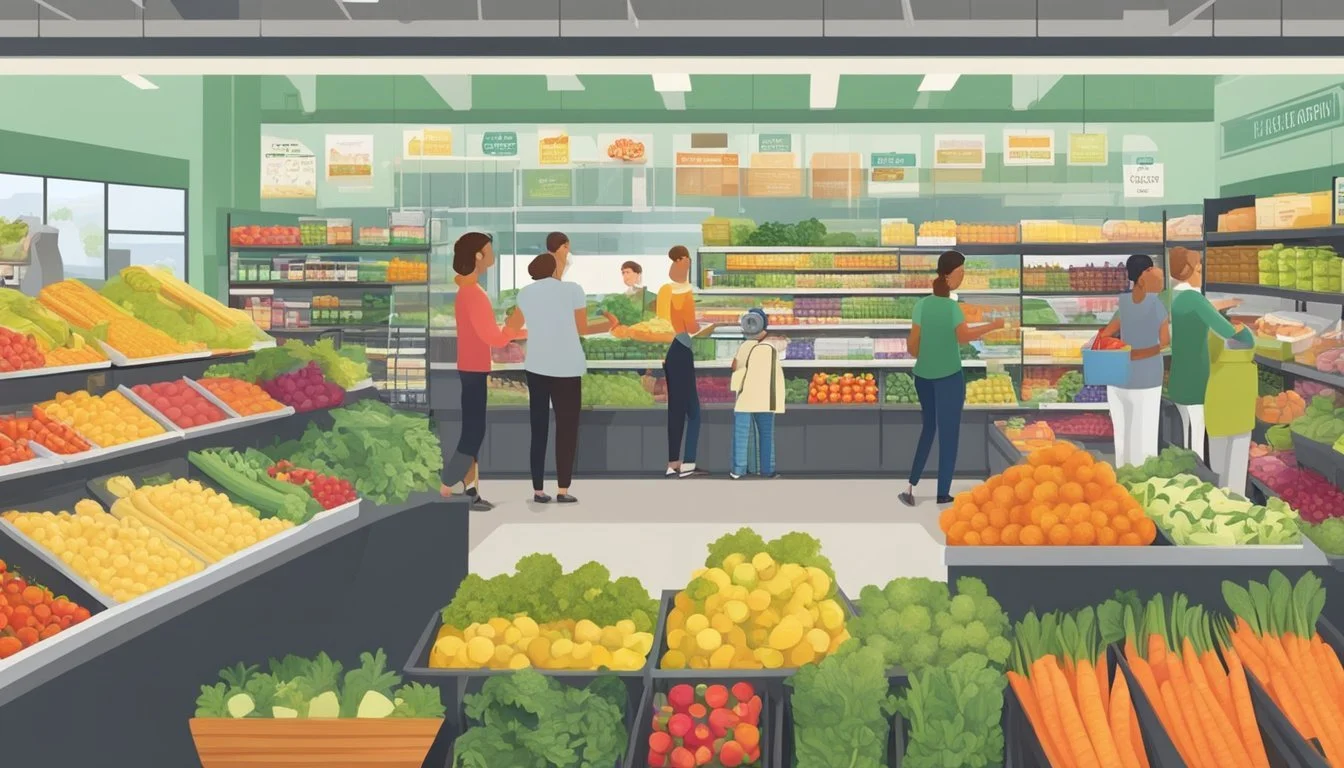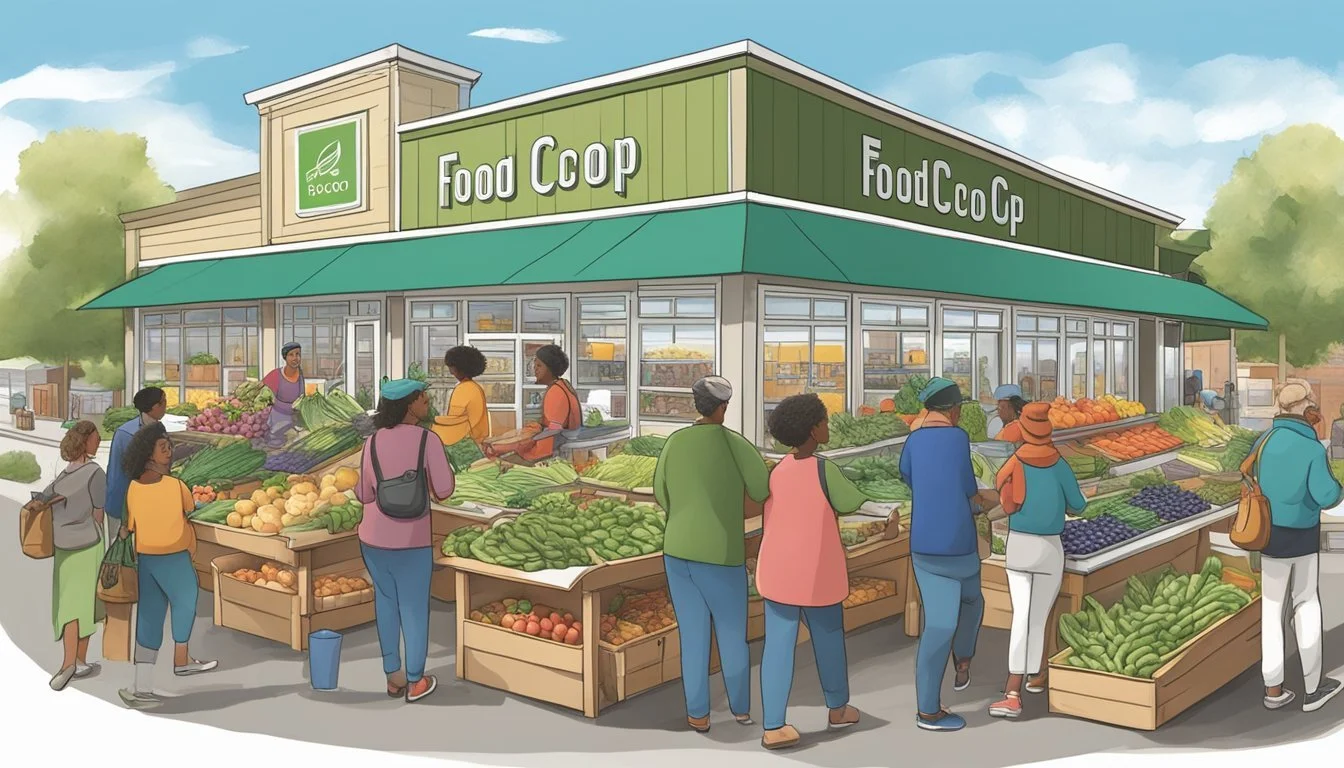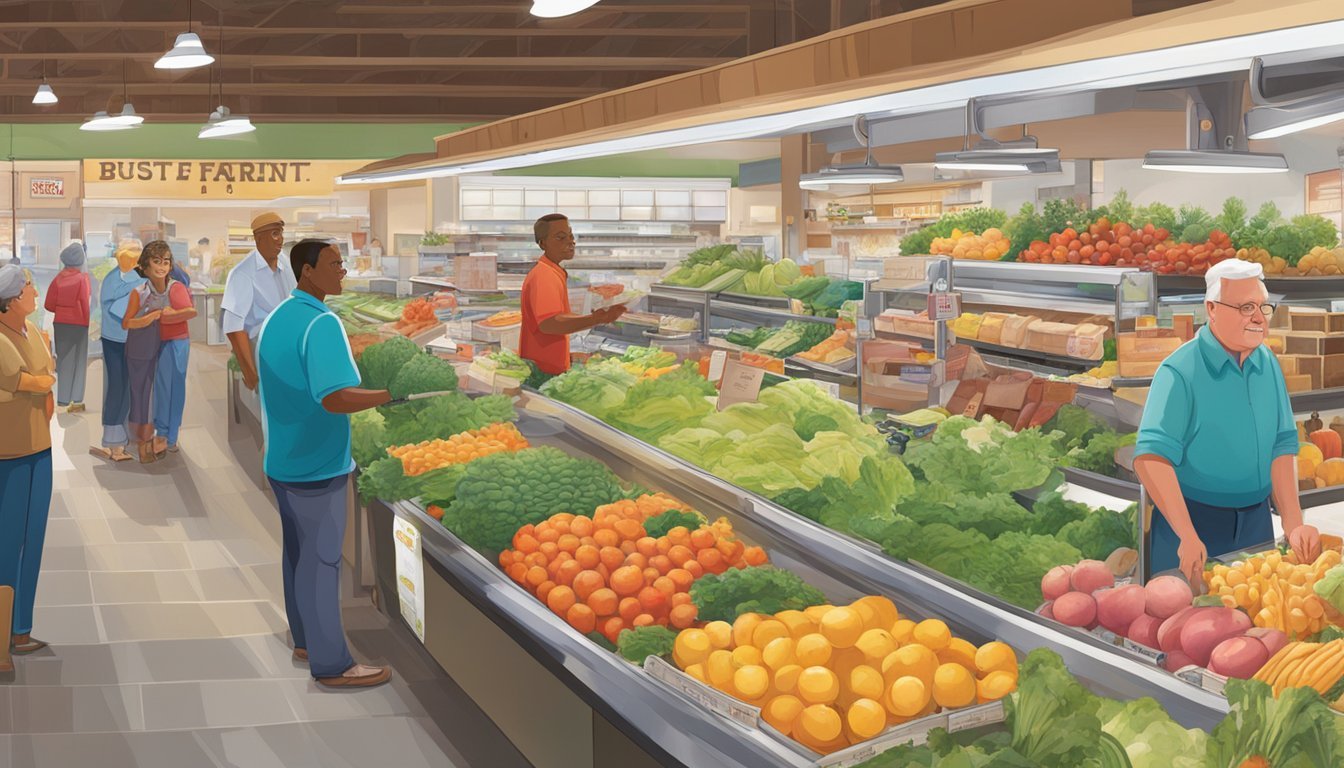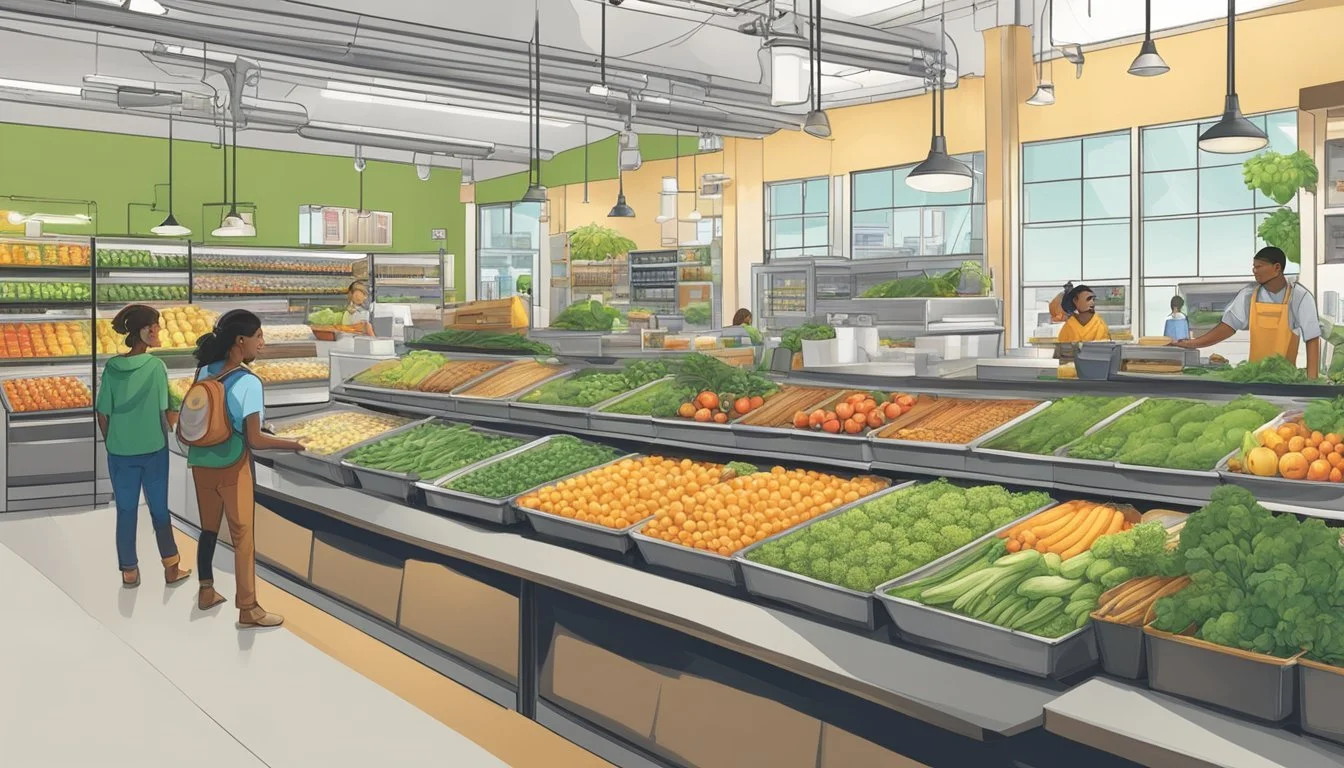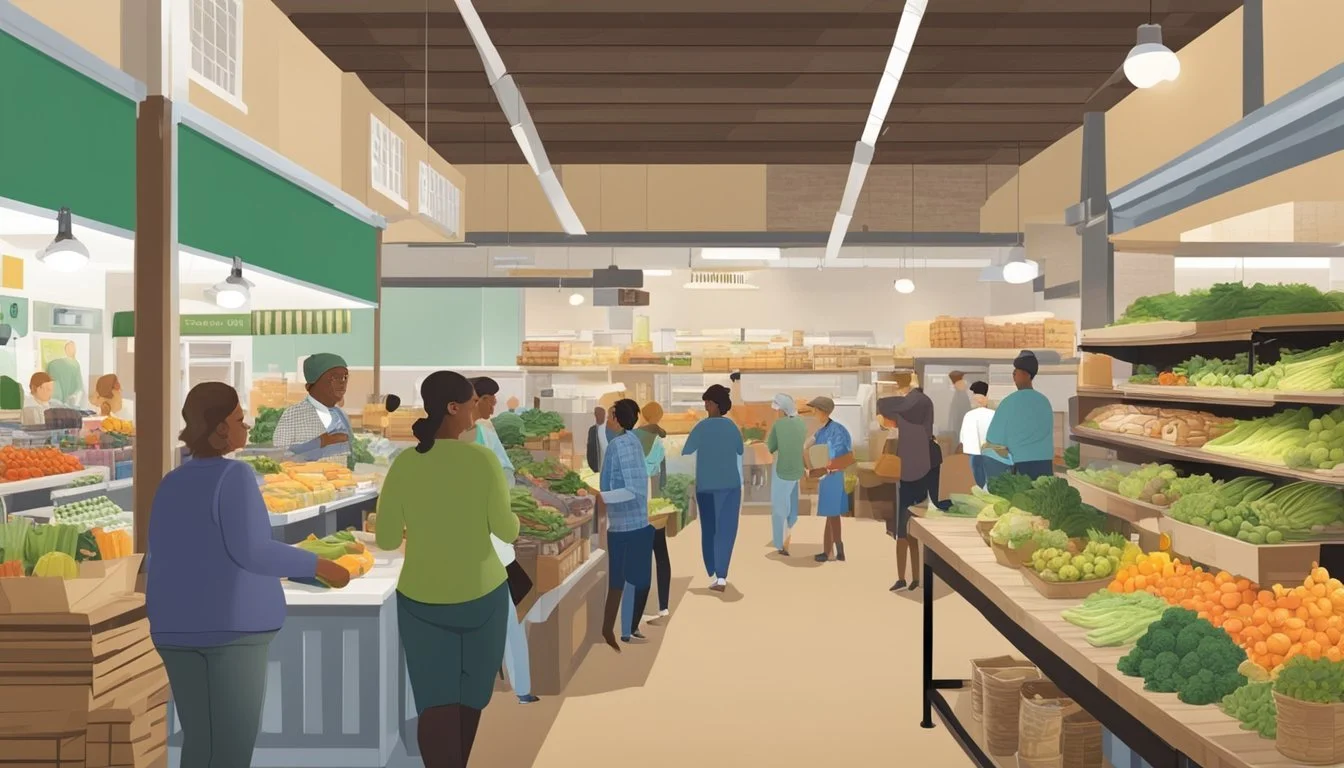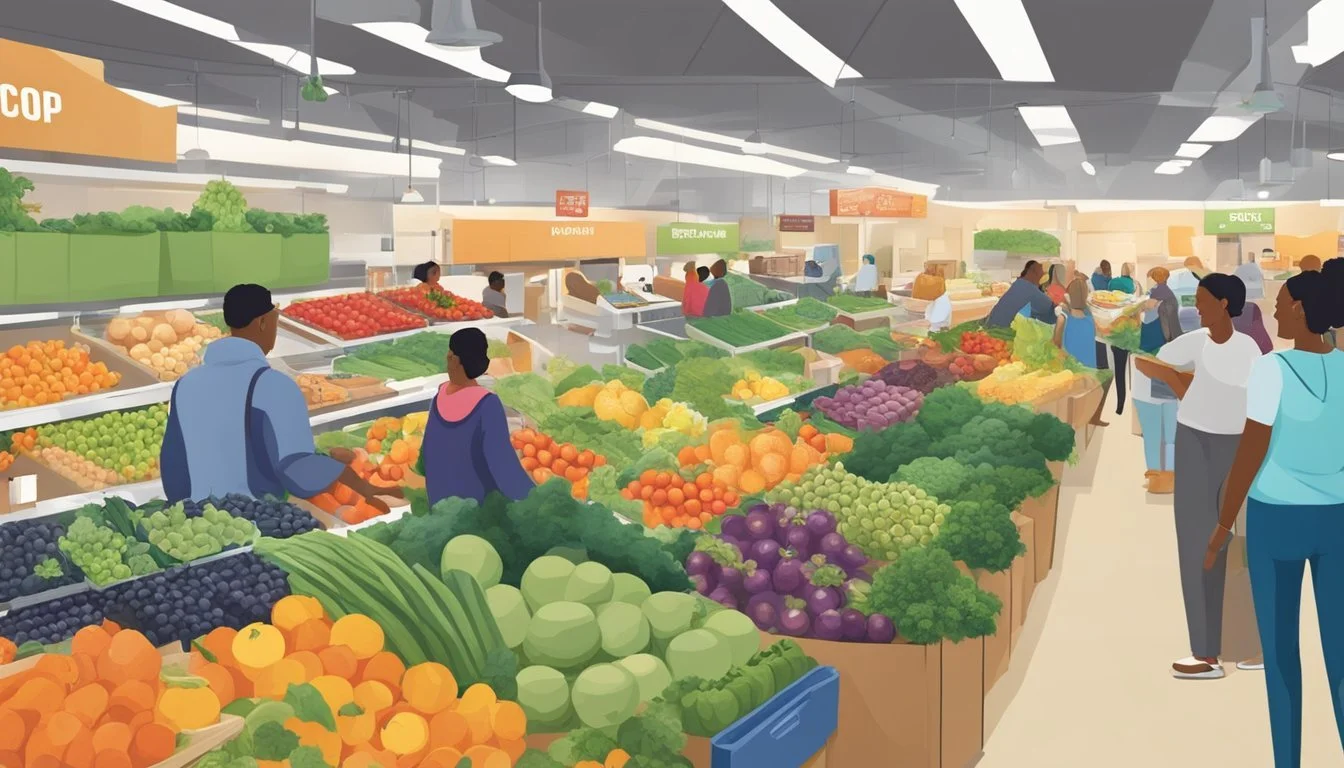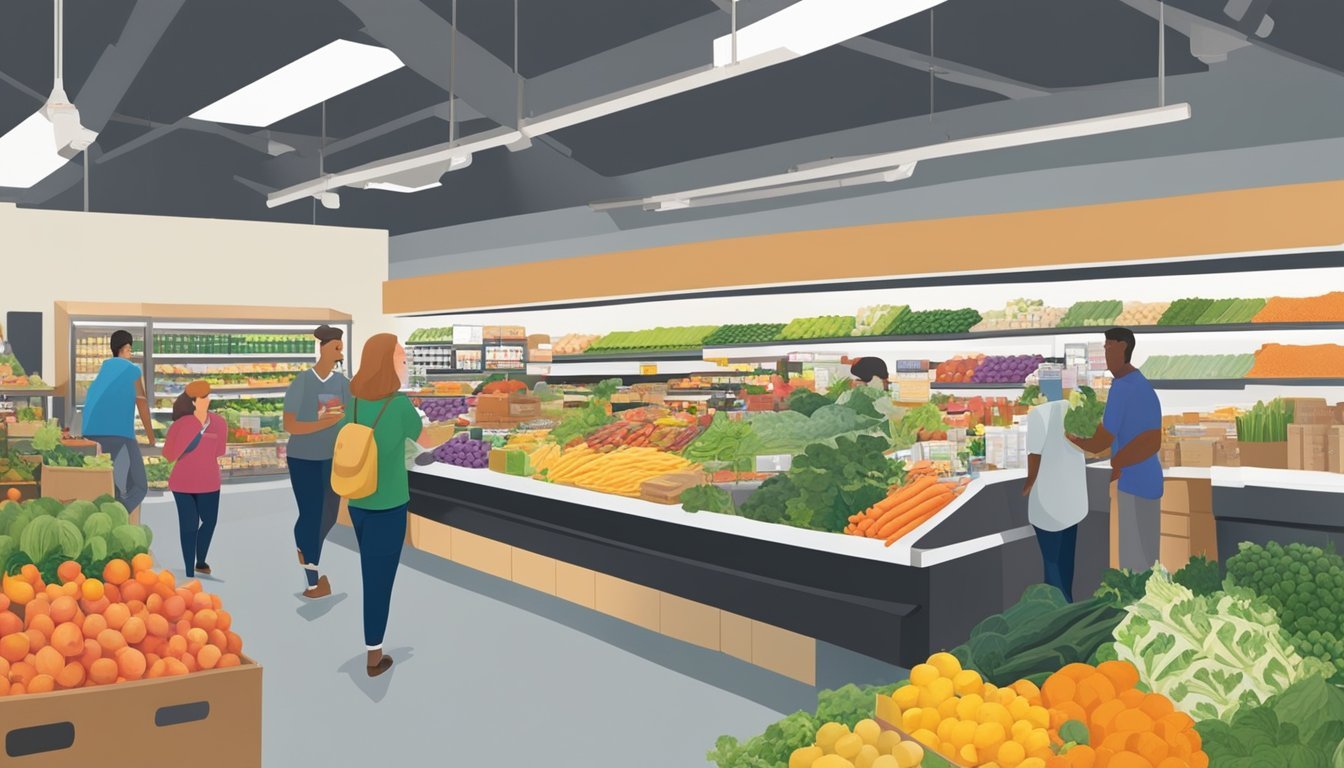Guide to Food Co-Ops in Hampton, VA
Your Local Shopping Guide
Food cooperatives, commonly known as food co-ops, present an alternative to mainstream grocery shopping, focusing on community-led efforts that prioritize local and organic produce. In Hampton, Virginia, residents can explore various co-ops that serve as a nexus for those seeking locally sourced food, connecting them directly with family-owned farms in the Hampton Roads area. Coastal Farms, for one, is an online farm-to-family program representing over 60 local farms, offering a year-round supply of local products to the community.
These cooperatives do not merely offer fresh products; they also play a significant role in sustaining local economies and fostering direct relationships between consumers and growers. The RealFood Williamsburg Community Cooperative underscores this connection by providing a grocery shopping experience deeply integrated into the local ecosystem, thereby promoting healthful living through fresh, farm-sourced food. The cooperative model empowers consumers as stakeholders in a system where they can exert influence on food sourcing and selection, with many co-ops also focusing on educational initiatives related to food and sustainability.
Beyond nutrition and economy, food co-ops in Virginia are anchored in enriching the social fabric of their communities. They often become hubs for educational resources and inclusive practices, illustrating the broader objectives of such enterprises as delineated by the Virginia Cooperative Council. These co-ops nurture equitable economic relationships, positive environmental impacts, and inclusive, socially responsible practices. As grocery establishments owned by local residents, their operations are tightly woven with the interests and well-being of the communities they serve.
What Is a Food Co-Op?
A food co-op is a type of grocery establishment intricately linked to a sense of community. It operates on the principles of a cooperative, implying that it is a collectively owned enterprise by its members, who are typically also its customers. These members invest to share in both the responsibilities and benefits of the store.
Ownership and Operations Food co-ops are unique as they are independently owned by community members. These members make critical decisions such as:
Stock Selection
Determining what items to sell
Emphasizing organic and natural products
Source of Products
Choosing to purchase from local farms and ethical providers
Quality Standards
Defining criteria for inventory and vendor selection
Membership Benefits Members often receive various benefits, including:
Discounts: Reduced prices on groceries
Voting Rights: A say in operational and governance decisions
Community Connection: Opportunities to bond with locals and support the local economy
Role in the Community Food co-ops nourish their communities by providing access to high-quality, often locally-sourced products. They also foster an environment where consumers are contributors to the economic vitality of the region.
In Summary They are entities that not only focus on the sale of grocery items but also champion a customer-involved approach to business. The cooperative model cultivated by these entities enables a democratic form of ownership that puts value on both the individual and the collective.
Benefits of Joining a Food Co-Op
Joining a food co-op in Hampton, VA, provides multiple advantages for both individuals and the community. Members gain access to healthy food options, as co-ops often focus on supplying fresh, affordable fruits and vegetables, along with other nutritious items. This focus helps members maintain a balanced diet.
Food co-ops also invest in environmentally responsible food sources. They commonly prioritize:
Local produce
Organic farming
Minimal packaging
This approach supports sustainable agriculture and reduces the carbon footprint by decreasing the distance food travels from farm to table.
Here are some direct benefits of becoming a member of a food cooperative:
Affordability: Members often enjoy lower prices due to shared ownership and volunteer contributions.
Community Impact: Profits are typically reinvested locally, bolstering the local economy and supporting local farmers.
Health and Wellness: Co-ops often conduct educational programs on healthy eating.
Furthermore, members are typically involved in decision-making processes, which ensures that the co-op aligns with the values and needs of its members. Through these avenues, food co-ops cultivate a sense of community and mutual support.
How Food Co-Ops Support Local Farmers
Food cooperatives (co-ops) play a crucial role in sustaining local agriculture in Hampton, VA, by forming a symbiotic relationship with the area's farmers. They primarily support local farmers by purchasing their produce, which helps in circulating capital within the community and promotes economic growth. Local produce is a staple at food co-ops, spotlighting the bounty of Hampton's agrarian efforts.
Direct Purchase: Food co-ops often buy directly from local farmers, bypassing intermediaries. This shortens the supply chain and increases the profit margin for the producers of local food.
Fair Pricing: By offering a fair price, co-ops ensure that farmers receive adequate compensation for their labor and investment, contrary to the often suppressive pricing from large-scale buyers.
Community Engagement: Co-ops often foster community awareness about the importance of supporting local farms, which can increase consumer demand for local, fresh produce.
Consistent Market: Local farmers benefit from a consistent and reliable marketplace offered by food co-ops. A stable demand for their goods means they can plan and farm more efficiently and sustainably.
Furthermore, several food co-ops engage in education and advocacy to further sustain and strengthen local farming communities. By informing consumers about the origins of their food and the benefits of buying local, co-ops encourage community members to make choices that benefit local farms. Through such initiatives, food co-ops in Hampton, VA, not only provide a lifeline for local farmers but also ensure that the community has access to fresh and nutritious produce.
Available Products at Hampton's Food Co-Ops
Hampton's food co-ops offer an array of locally sourced and organic products spanning from fresh produce to artisanal bakery items. They prioritize community wellness by providing nutritious, fresh, and high-quality goods.
Fresh Produce
Hampton's food co-ops feature a variety of fresh produce, including fruits and vegetables that are often locally sourced. During peak harvest seasons, shoppers can find a dynamic selection of produce that celebrates the region's bounty.
Dairy and Eggs
The dairy section in these co-ops includes a range of milk, cheese, and yogurt, all sourced from local or regional dairies to ensure freshness and support community producers. Eggs come from local farms where hens are typically raised in humane, free-range conditions.
Meat and Poultry
Customers seeking meat and poultry products will find grass-fed beef, free-range chicken, and other meat options. These products come from local farms that often pride themselves on sustainable and ethical farming practices.
Bakery and Bread
The co-ops' bakery section offers an assortment of baked goods, from whole-grain loaves to specialty breads. These items are often made in-house or sourced from local artisan bakers, focusing on quality ingredients and traditional baking methods.
Bulk Goods
For those interested in eco-friendly shopping and reduced waste, the bulk section provides an opportunity to purchase grains, nuts, seeds, and other bulk items. Shoppers can buy as much or as little as they need, making it a practical choice for budget-conscious and environmentally aware individuals.
Special Programs and Services
Food co-operatives in Hampton, Virginia, offer a range of special programs and services designed to foster community engagement, provide education on sustainable practices, and offer inclusive opportunities for members to contribute to their local food system.
Community Support and Outreach
Co-ops in Hampton actively participate in community support and outreach programs. Through initiatives such as the Bethel AME Church Food Pantry and the Virginia Peninsula Foodbank, they serve the Hampton Roads area by providing access to healthy food options. These pantries play a crucial role in supplying nutritious meals to those in need, ensuring that community support extends beyond just selling food.
Educational Workshops and Events
Education is at the heart of many co-op programs. Virginia Cooperative Extension is notably engaged in educational outreach, enabling citizens to learn about agriculture, natural resources, and food resilience. The co-op hosts workshops and events aimed at enhancing knowledge about local food systems and sustainable living practices.
Membership and Volunteer Opportunities
Co-ops in Hampton provide numerous opportunities for community members to get involved beyond the consumer-merchant relationship. Members can volunteer in various capacities, such as helping with food distribution through pantries or participating in programs that advocate for food security and local agriculture. Volunteer efforts not only enhance the co-op's operations but also strengthen community ties and personal investment in the local food movement.
Environment and Sustainability Practices
Food cooperatives in Hampton, VA, prioritize environmentally responsible practices and sustainable agriculture. They integrate their concern for the environment into various aspects of their operations. Many food co-ops stock products from local farmers practicing sustainable agriculture, thereby reducing carbon emissions associated with long-distance transportation.
Waste Management:
Composting: Several co-ops contribute to waste reduction by composting food scraps, which not only diverts waste from landfills but also reduces the production of greenhouse gases.
Food Donation: Co-ops often donate surplus food, which not only supports community members in need but also minimizes food waste.
Sustainable Sourcing:
Local and Organic: Many co-ops ensure that a significant portion of their inventory includes locally sourced and organic food options.
Pasture-Raised Products: They support pasture-raised meat and dairy farming practices which are typically more sustainable and eco-friendly.
Energy Efficiency: Co-ops often employ energy-saving practices within their stores as part of their commitment to environmental stewardship.
By engaging in these practices, food co-ops in Hampton not only promote healthier lifestyle choices but also contribute to the development of a sustainable, environmentally responsible food system. Through community-oriented initiatives and responsible sourcing, these co-ops demonstrate their commitment to positive environmental impact.
Supporting Local Economy and Food Security
Food co-ops in Hampton, VA, play a vital role in bolstering the local economy and enhancing food security. By emphasizing local sourcing, these cooperatives significantly contribute to the financial well-being of nearby farms and businesses, ensuring that a larger percentage of consumer spending stays within the community.
Local Economic Impact:
Food co-ops spend substantially on local wages and benefits, circulating money within the local economy.
They foster economic growth by doing business with local producers, which is markedly higher than conventional grocery stores.
Enhancing Food Security:
Cooperatives often address hunger by making nutritious food more accessible, especially in areas with few grocery options.
Their commitment to community support extends to providing healthy food options and co-op membership that's accessible to all community members.
Community Support:
By prioritizing local products, they strengthen the local food system, thereby safeguarding against supply chain disruptions.
Food co-ops make it simpler for consumers to support local producers, translating to a resilient local agricultural sector.
Stakeholders Benefits Local farms Increased sales, sustainable farming practices Local businesses Expanded market, community engagement Co-op members Patronage dividends, stronger purchasing power Non-member shoppers Access to local produce, contribution to local economy
Through these efforts, food co-ops in Hampton establish themselves as cornerstones for local economic stability and food security, addressing the community's needs while stimulating the regional agricultural and business sectors.
How to Join and Participate in a Food Co-Op
Joining a food co-op in Hampton, VA, involves a few systematic steps. Interested individuals should first contact the co-op to understand the eligibility criteria, membership benefits, and responsibilities. This initial engagement is often facilitated through the co-op's website, or they can attend an informational meeting if available.
Membership typically requires an investment, such as a refundable Capital Investment (CI), and a modest join fee. Here is a common structure of fees for joining a co-op:
One-time join fee: $5
Monthly installment: $2 per month during shopping trips until $100 CI is reached
Full payment option: $100 plus join fee (offers may include a free co-op cloth bag)
Prospective members can donate time or resources to the co-op, which usually supports local farmers and small businesses. Volunteering at the co-op is also a form of participation and investment in the cooperative's success.
Once a member, individuals have a voice in the co-op's operation, as it operates on a democratic member control principle. Members may vote on significant decisions, have the opportunity to serve on the board, or participate in partnerships that a co-op has established with community entities.
It’s recommended that members thoroughly understand their rights and responsibilities, which include but are not limited to, regular participation in meetings, voting on important issues, and potentially volunteering time for co-op activities. All these actions strengthen the cooperative and highlight the commitment to the community's economic and social well-being.
Food Co-Ops in the Surrounding Areas
Residents of Hampton, VA have the opportunity to access a variety of food co-ops in the neighboring areas. Each co-op offers a unique selection of local and naturally grown foods, strengthening community ties and providing alternatives to conventional grocery shopping.
RealFood Williamsburg Community Co-Op
RealFood Williamsburg Community Co-Op operates with a commitment to bringing individuals together to purchase natural foods directly from producers. They focus on providing both organic and sustainable options, which supports the environment and local farmers. By joining the co-op, members gain access to fresh, locally sourced produce and goods that are less commonly found in standard supermarkets.
Norfolk's Local Food Initiatives
In Norfolk, VA, local food initiatives thrive, with an emphasis on urban agriculture and community engagement. Food co-ops here play a crucial role in making high-quality, fresh produce accessible to city residents. These initiatives often facilitate connections between Norfolk residents and area farmers, fostering a deeper appreciation for locally produced food.
Suffolk Agriculture and Food Programs
Suffolk, VA is home to a range of agriculture and food programs, many of which underscore the importance of local sourcing and cooperation between consumers and growers. Suffolk's proximity to farmland enriches their co-ops with an abundance of regional produce, allowing shoppers to partake in the local bounty. These programs often provide education on food sources, emphasizing the benefits of consuming goods grown close to home.
Frequently Asked Questions About Food Co-Ops
When exploring Food Co-Ops in Hampton, VA, shoppers have common inquiries about membership, store operations, and where the food comes from. This section addresses those frequent questions, providing clear and succinct information.
Membership Fees and Requirements
Are there fees associated with becoming a member of a Food Co-Op?
Yes, most Food Co-Ops require a one-time membership fee or investment to become a part-owner of the store. These fees are typically used to fund the start-up and operational costs of the co-op and may provide members with benefits such as discounts.
What are the requirements to maintain membership?
Regular purchases or participation in the co-op's events and governance might be necessary. Some co-ops also require members to put in a few hours of work each year, contributing to the co-op's operations.
Operational Hours
When is the Food Co-Op open for shopping?
Food Co-Ops generally maintain specific hours of operation similar to other grocery stores. It's common for the co-ops to be open seven days a week, often with extended hours to accommodate a range of schedules. The exact hours can be found by contacting the co-op directly or visiting their website.
Product Sourcing
Where does a Food Co-Op source its products from, and does it offer organic options?
Products at Food Co-Ops are frequently sourced locally to support regional farmers and producers. This includes a commitment to providing affordable, healthy food options. Many co-ops place a strong emphasis on organic and sustainably produced goods.
Does the co-op guarantee the availability of healthy and organic food?
While selection can vary based on availability and season, Food Co-Ops are renowned for offering an extensive range of healthy and often organic options, striving to provide consumers with the best quality products.
Conclusion
Food co-ops serve as pivotal links between Virginia farmers and local homes. In Hampton, VA, co-ops like Coastal Farms work with over 60 local farms, highlighting a strong community-oriented food system. These co-ops ensure that families have access to fresh, locally-sourced products throughout the year.
Community Involvement Community participation is the backbone of successful food co-ops. By choosing to shop at food co-ops, consumers directly empower local farmers and producers. This, in turn, fosters a sustainable food economy. Members of the community often have the option to contribute to these co-ops, not only as consumers but also as part-owners or volunteers, which strengthens the local food networks.
Economic Impact By providing marketing and distribution channels, co-ops help to maintain the economic vitality of the region. They are integral in ensuring that the revenue generated from food stays within Virginia. This economic model also helps in safeguarding the diversity of food available in the region.
Education and Outreach Co-ops often take on the role of educators, informing the public about the benefits of local food consumption. They sometimes host visits and provide literature to spread awareness about sustainable practices. This knowledge-sharing helps communities make informed choices about their food sources and consumption habits.
Accessibility Hampton's food co-ops strive to make local, nutritious food accessible. Initiatives such as online ordering from co-ops like Coastal Farms demonstrate a commitment to adapting to the needs of modern families, ensuring the long-term power of community-supported agriculture.
Food co-ops in Hampton, VA play a vital role in connecting local farms to the tables of Virginia homes, embodying community resilience and a sustainable future for food in the region.

